

Miloš Forman. Bernardo Bertolucci. Federico Fellini. Italian filmmaker Federico Fellini, Cavaliere di Gran Croce OMRI (Italian: [fedeˈriːko felˈliːni]; 20 January 1920 – 31 October 1993) was an Italian film director and screenwriter known for his distinctive style, which blends fantasy and baroque images with earthiness.
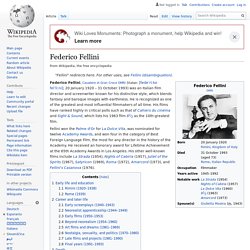
He is recognized as one of the greatest and most influential filmmakers of all time. His films have ranked highly in critical polls such as that of Cahiers du cinéma and Sight & Sound, which lists his 1963 film 8 1⁄2 as the 10th-greatest film. Early life and education[edit] Rimini (1920–1938)[edit] Fellini was born on 20 January 1920, to middle-class parents in Rimini, then a small town on the Adriatic Sea.
Enrolled at the Ginnasio Giulio Cesare in 1929, he made friends with Luigi Titta Benzi, later a prominent Rimini lawyer (and the model for young Titta in Amarcord (1973)). Michelangelo Antonioni. Italian film director and screenwriter (1912-2007) Early life[edit] Antonioni was born into a prosperous family of landowners in Ferrara, Emilia Romagna, in northern Italy.
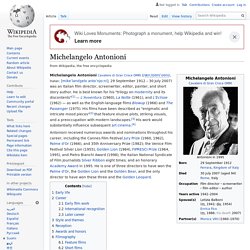
He was the son of Elisabetta (née Roncagli) and Ismaele Antonioni.[5] The director explained to Italian film critic Aldo Tassone: My childhood was a happy one. My mother ... was a warm and intelligent woman who had been a laborer in her youth. William Friedkin. Stephen Frears. British film director and producer In 2008, The Daily Telegraph named Frears among the 100 most influential people in British culture.[2]
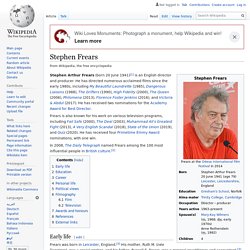
Roger Corman. American film director, producer, and actor Roger William Corman (born April 5, 1926)[3] is an American director, producer, and actor.[4][5] He has been called "The Pope of Pop Cinema" and is known as a trailblazer in the world of independent film.
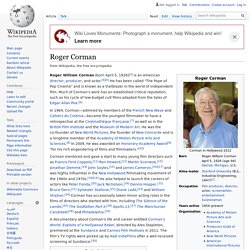
Much of Corman's work has an established critical reputation, such as his cycle of low-budget cult films adapted from the tales of Edgar Allan Poe.[6] In 1964, Corman—admired by members of the French New Wave and Cahiers du Cinéma—became the youngest filmmaker to have a retrospective at the Cinémathèque Française,[7] as well as in the British Film Institute and the Museum of Modern Art.
John Ford. Irish-American film director.
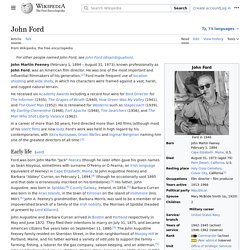
Federico Fellini. Michelangelo Antonioni. Hal Ashby. American film director and film editor William Hal Ashby (September 2, 1929 – December 27, 1988)[1] was an American film director and editor[2][3] associated with the New Hollywood wave of filmmaking.
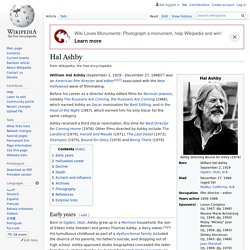
Early years[edit] Born in Ogden, Utah, Ashby grew up in a Mormon household, the son of Eileen Ireta (Hetzler) and James Thomas Ashby, a dairy owner.[4][5] His tumultuous childhood as part of a dysfunctional family included the divorce of his parents, his father's suicide, and dropping out of high school. Ashby-approved studio biographies concealed the latter fact, falsely stating that he graduated from Utah State University (in nearby Logan, Utah) to ensure he fit into the social milieu of college-educated peers like Francis Ford Coppola and Martin Scorsese. Wes Craven. American filmmaker and novelist Wesley Earl "Wes" Craven (August 2, 1939 – August 30, 2015) was an American filmmaker, actor, and novelist.
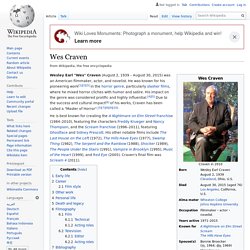
He was known for his pioneering work[1][2][3] in the horror genre, particularly slasher films, where he mixed horror cliches with humor and satire. His impact on the genre was considered prolific and highly influential.[4][5] Due to the success and cultural impact[6] of his works, Craven has been called a "Master of Horror".[3][7][8][9][10] Miloš Forman.
Alejandro González Iñárritu. Alejandro González Iñárritu (; American Spanish: [aleˈxandɾo ɣonˈsales iˈɲaritu]; born 15 August 1963) is a Mexican film director, producer, and screenwriter.
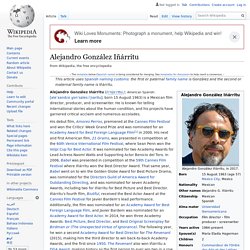
He is known for telling international stories about the human condition, and his projects have garnered critical acclaim and numerous accolades. Early life[edit] Soon after, Iñárritu left home and worked as a sailor on cargo boats, taking two trips at the ages of 16 and 18, sailing through the Mississippi River and then visiting Europe and Africa. With $1,000 supplied by his father, Iñárritu stayed in Europe for a year on the second trip.[9][10] He has noted that these early travels as a young man have had a great influence on him as a filmmaker,[10] and the settings of his films have often been in the places he visited during this period.[8] After his travels, Iñárritu returned to Mexico City and majored in communications at Universidad Iberoamericana, one of the most prestigious private universities in Mexico.[11] Gareth Evans (director) Executive producer.
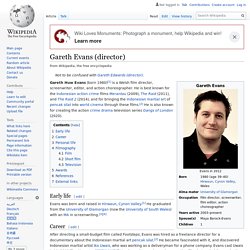
Don Coscarelli. Biography[edit] Coscarelli was born in Libya and raised in Southern California.
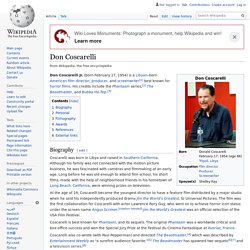
Although his family was not connected with the motion picture business, he was fascinated with cameras and filmmaking at an early age. Long before he was old enough to attend film school, his short films, made with the help of neighborhood friends in his hometown of Long Beach, California, were winning prizes on television. At the age of 19, Coscarelli became the youngest director to have a feature film distributed by a major studio when he sold his independently produced drama Jim the World's Greatest, to Universal Pictures. The film was the first collaboration for Coscarelli with actor Lawrence Rory Guy, who went on to achieve horror icon status under the screen name Angus Scrimm. Coscarelli was the recipient of the Bram Stoker Award for Best Screenplay for his film Bubba Ho-Tep, which he also directed. William Friedkin. Lucio Fulci. Lucio Fulci (Italian: [ˈlutʃo ˈfultʃi]; 17 June 1927 – 13 March 1996) was an Italian film director, screenwriter and actor.
Because of the high level of visceral graphic violence present in many of his films, especially Zombi 2, The Beyond, Contraband and The New York Ripper, Fulci is frequently referred to as "The Godfather of Gore",[2] a title also given to Herschell Gordon Lewis. Marco Ferreri. Marco Ferreri (11 May 1928 – 9 May 1997) was an Italian film director, screenwriter and actor, who began his career in the 50s directing three films in Spain. §Biography[edit] He was born in Milan. Kenneth Anger. Robert Altman. Alejandro Amenábar. Alejandro Fernando Amenábar Cantos, commonly known as Alejandro Amenábar (born March 31, 1972), is a Spanish writer, composer and director. Among other honors, he has won an Academy Award, 8 Goyas and one European Film Award. He has written the screenplays to all six of his movies and composed almost all of the soundtracks.
Early life[edit] Amenábar is the son of a Chilean man, Hugo Ricardo Amenábar and a Spanish woman, Josefina Cantos. He has a dual Chilean-Spanish citizenship. Alexandre Aja. Michelangelo Antonioni. Woody Allen. Dario Argento. Darren Aronofsky. Hal Ashby. Wes Anderson. Pedro Almodóvar. Robert Aldrich. Michelangelo Antonioni. Ralph Bakshi. Ingmar Bergman. Bertrand Blier. John Boorman. Robert Bresson. Jaume Balagueró. Luis Buñuel. Jean-Jacques Beineix. Peter Bogdanovich. Bernardo Bertolucci. Mario Bava. Tod Browning. Tim Burton. Frank Capra. Leos Carax. John Carpenter.
John Cassavetes. David Cronenberg. Costa-Gavras. Jack Clayton. Larry Charles. Park Chan-wook. Claude Chabrol. Henri-Georges Clouzot. Anton Corbijn. George Cukor. Cameron Crowe. Youssef Chahine. Stephen Chow. Marcel Carné. William Castle. Michael Curtiz. George Cukor. Francis Ford Coppola. Sofia Coppola. Coen brothers. Jacques Demy. Tom DiCillo. Stanley Donen. Jules Dassin. Jan de Bont. Julien Duvivier. Álex de la Iglesia.
Joe Dante. Giuseppe De Santis. Vittorio De Sica. Guillermo del Toro. Marguerite Duras. Lee Daniels. Richard Donner. Blake Edwards. Homayoun Ershadi. Florent Emilio Siri. Jean Eustache. Federico Fellini. Mike Figgis. Richard Fleischer. David Fincher. Abel Ferrara. Lucio Fulci. Georges Franju. John Ford. William Friedkin. Georges Franju. Cary Fukunaga. Victor Fleming. Jesús Franco. Terence Fisher.